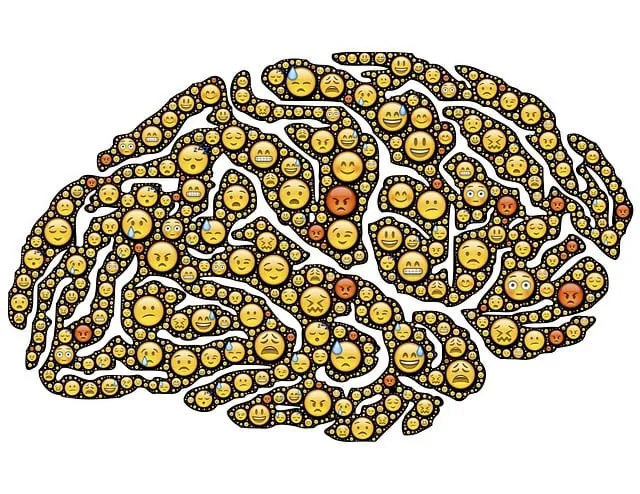Mindfulness meditation, rooted in Buddhist philosophy, is a powerful tool for present-moment awareness and non-judgmental acceptance of thoughts and sensations, as practiced at Englewood Kaiser Permanente mental health services. This practice reduces stress, anxiety, and depression, enhances emotional regulation, and improves overall mental wellness. Creating an ideal environment and adopting a curious mindset are crucial for successful meditation. Simple breathing exercises calm the mind and trackable progress in a mental wellness journal reinforce these practices. Cultivating awareness teaches non-judgmental observation of thoughts and sensations, promoting positive thinking and effective support for diverse patient populations through Cultural Competency Training. Integrating mindfulness into daily life supports emotional well-being, enhances resilience to stress, and improves mood management and social skills over time.
At Englewood Kaiser Permanente, prioritizing mental well-being is paramount. This guide delves into the transformative power of mindfulness meditation, offering practical steps for those new to this ancient practice. From understanding its foundational benefits to cultivating awareness and integrating it into daily life, each section provides essential tools for enhancing mental clarity and overall resilience. Discover how creating a serene environment, mastering breathing techniques, and non-judgmental observation can lead to lasting peace and improved mental health.
- Understanding Mindfulness Meditation: A Foundation for Mental Well-being
- Preparing Your Space and Mindset: Creating an Ideal Environment
- The Art of Breathing: Techniques to Calm the Mind
- Cultivating Awareness: Observing Thoughts and Sensations without Judgment
- Integrating Mindfulness into Daily Life: Sustaining Practice for Long-term Benefits
Understanding Mindfulness Meditation: A Foundation for Mental Well-being

Mindfulness meditation is a practice that cultivates present-moment awareness and non-judgmental acceptance of thoughts, feelings, and sensations. It’s a simple yet profound technique with deep roots in ancient Buddhist philosophy. By focusing on the breath or bodily sensations, individuals can learn to observe their minds without getting swept away by thoughts, emotions, or external distractions. This practice is not about stopping thoughts but rather about noticing them without attachment or reactivity.
Englewood Kaiser Permanente mental health professionals emphasize that mindfulness meditation serves as a foundation for mental well-being. Regular practice has been linked to reduced stress, anxiety, and depression, as well as improved focus, emotional regulation, and overall life satisfaction. It’s a powerful tool for coping skills development, enabling individuals to navigate challenging situations with greater clarity and composure. The Mental Wellness Podcast Series Production highlights numerous studies showcasing the benefits of mindfulness meditation in enhancing mental wellness and promoting resilience.
Preparing Your Space and Mindset: Creating an Ideal Environment

Creating an Ideal Environment for Mindfulness Meditation
Before beginning your mindfulness meditation practice, it’s essential to prepare both your space and mindset. Engage in a process of cultivating a tranquil atmosphere that facilitates inner peace and focus. At Englewood Kaiser Permanente mental health services, we advocate for carving out a dedicated corner in your home or workspace that feels serene and free from distractions. This might involve dimming the lights, lighting scented candles, or playing soft, calming music to create an ambiance conducive to meditation.
Furthermore, set aside any preconceived notions or expectations about what mindfulness should look like. Approach this practice with curiosity and openness, allowing yourself to be present in the moment without judgment. Remember that burnout prevention strategies for healthcare providers often begin with effective communication strategies and self-care practices, such as mindfulness meditation. By preparing your space and mindset, you’re taking a significant step towards prioritizing your well-being and enhancing your overall mental health journey.
The Art of Breathing: Techniques to Calm the Mind

Breathing is a powerful tool to calm and focus the mind, a technique often at the core of mindfulness meditation practices. At Englewood Kaiser Permanente mental health services, we emphasize the art of breathing as a foundational skill for enhancing mental wellness. Through simple yet effective exercises, individuals can learn to harness their breath to reduce stress and cultivate a sense of inner peace.
One such technique involves mindful, deep breathing where one pays close attention to each inhalation and exhalation. This practice helps to anchor the mind in the present moment, calming racing thoughts and promoting relaxation. Incorporating this into your daily routine, whether during a dedicated meditation session or as a brief pause throughout the day, can significantly improve overall mental health and resilience, according to communication strategies taught in Cultural Competency Training programs. Additionally, maintaining a mental wellness journal with breathing exercises can serve as a valuable tool for tracking progress and reinforcing these calming practices.
Cultivating Awareness: Observing Thoughts and Sensations without Judgment

Cultivating awareness is a fundamental aspect of mindfulness meditation practice. It involves observing your thoughts and sensations without judgment. When you engage in this practice at Englewood Kaiser Permanente mental health services, you learn to acknowledge and accept whatever arises within you, be it pleasant or unpleasant. This non-judgmental awareness allows you to step back from automatic reactions and gain a deeper understanding of your experiences.
In the context of stress management workshops organized by the Stress Management Workshops Organization, cultivating awareness can help in fostering positive thinking. By observing thoughts without judgment, you become more aware of the patterns that contribute to stress. This heightened awareness enables healthcare providers undergoing Cultural Competency Training to tailor their approach, ensuring more effective support for diverse patient populations.
Integrating Mindfulness into Daily Life: Sustaining Practice for Long-term Benefits

Integrating mindfulness into daily life is a powerful way to sustain meditation practice and unlock long-term benefits for your mental health. At Englewood Kaiser Permanente mental health services, we emphasize the importance of consistent engagement with mindfulness techniques. By incorporating practices like mindful breathing, body scans, or even simple acts of awareness during routine tasks, you can cultivate a deeper sense of presence and calm throughout your day. This ongoing commitment to mindfulness supports emotional well-being promotion techniques and enhances your overall resilience to stress.
Over time, regular mindfulness practice can contribute to improved mood management and social skills training. It allows individuals to develop a stronger awareness of their thoughts and emotions, fostering more thoughtful responses in various situations. By integrating mindfulness into daily routines, you create space for self-reflection, nurturing a deeper connection with yourself and those around you. This holistic approach to mental health can lead to significant improvements in overall emotional well-being and quality of life.
Mindfulness meditation, as guided by Englewood Kaiser Permanente’s mental health experts, is a powerful tool for enhancing overall well-being. By understanding its foundational principles, preparing a calm environment, focusing on breathing, cultivating awareness, and integrating practices into daily life, individuals can reap the long-term benefits of mindfulness. Embrace these strategies to transform your mental health journey and discover inner peace.






